UK Trailer Tents: Is There Life Left in the Market?
MARKETING STRATEGYTRAILER TENTS AND FOLDING CAMPERS
Will Hawkins
10/31/20247 min read
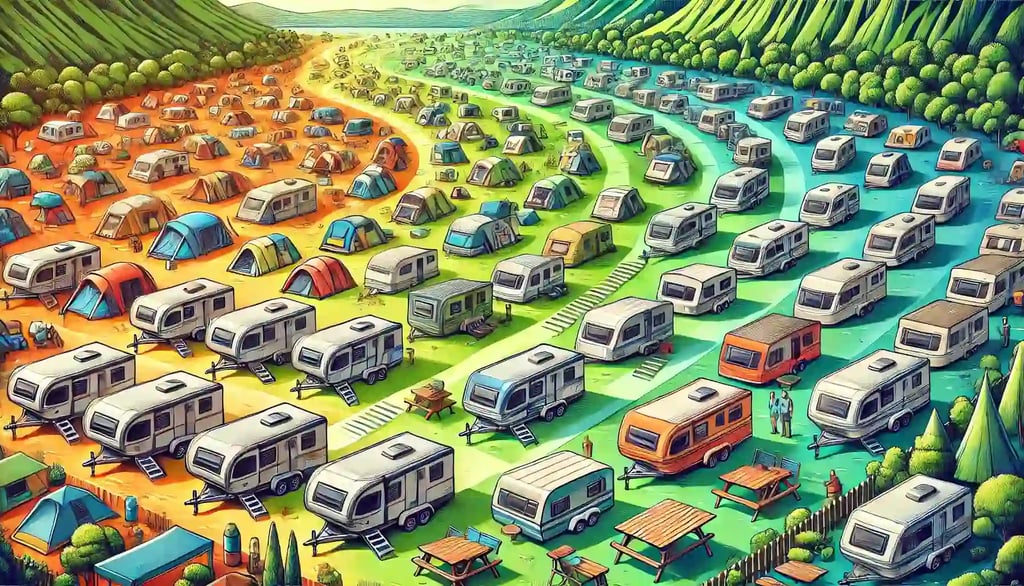

1. A Market on the Edge: What's Happening to Trailer Tents?
This week, we’re looking at the trailer tent and folding camper market. We’ll look at how companies in this market can adapt and evolve in tough times.
The UK market for trailer tents is in decline, if you look at interest online alone. But, it’s not all doom and gloom.
Image above: Google Trends data for ‘trailer tent’ since 2004
According to Semrush, there are still a significant number of searches each month for the following:
Trailer tent: 12,100/month
Trailer tents: 5,400/month
Folding camper: 1,300/month
With the volume of searches each month for those three keywords alone, there's a strong market.
Here are the top three websites now (Oct 2024) on Google for ‘trailer tent’ are:
Camperlands will get about 4,000 clicks a month from people who search for ‘trailer tent’ on Google. If they convert 1% of the clicks for the first trailer tent on their landing page, the ‘Camplair S’ £5,999, that equates to £239K+ a month in sales.
Nice business!
And there are some interesting innovations in the market, such as the Opus Camper range, which has injected innovation into the niche.


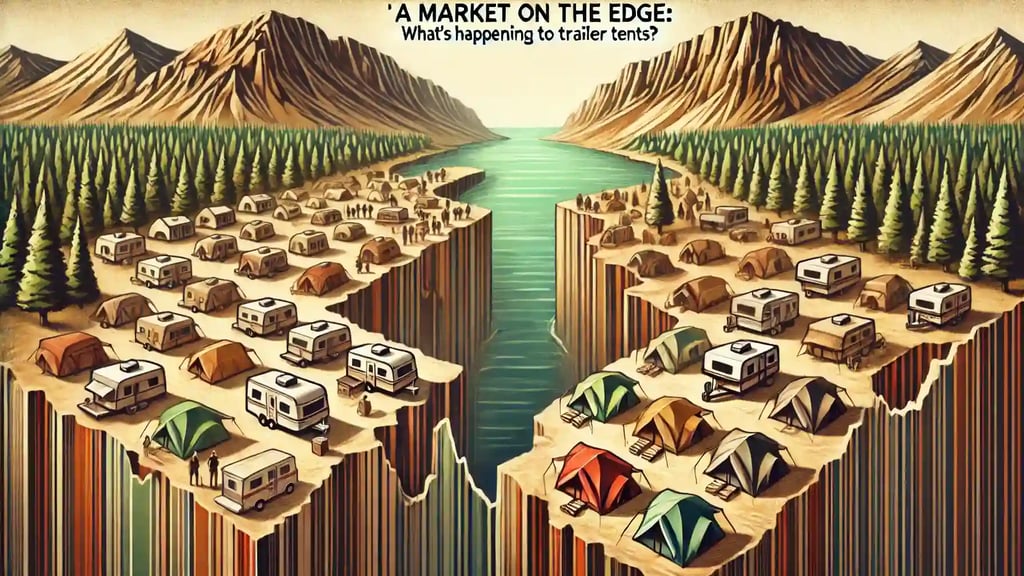

2. The Quiet Shift: Where Did the Buyers Go?
Where did the buyers for trailer tents go? Take a look at the chart below, and you'll see.
When the UK population has more disposable income, but interest in trailer tents is in decline, what other reasons could there be?
Confidence.
UK consumer confidence has taken a beating over the last ten years. People are holding onto their money.
This chart shows the decline since 2015.
What can you do about it?
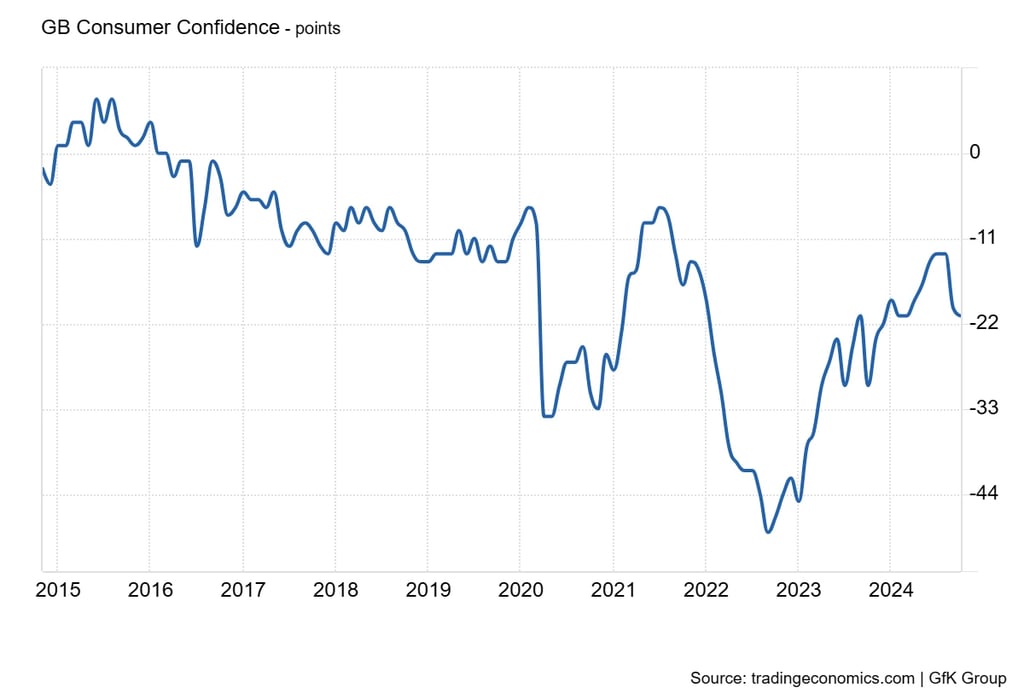

3. Hidden Opportunities: Who’s Still Buying Trailer Tents?
In a shrinking market, the fight for market share becomes hugely important.
Back in the early 2000s, I was in charge of UK sales for the publishing arm of a global technology company. My job was to sell computer books into UK bookshops through distributors.
The dotcom bubble had just burst and there was a slump in demand for computer books. Working with my distributors, we decided to focus our marketing efforts on special bookshops, tech stores, and Amazon to promote the books.
I cut out marketing spend on any retailer that didn’t meet the criteria. And invested in branded sections in store and online.
The result?
While competitors' sales continued to drop, mine stayed flat, which meant we’d gained a lot of market share. That might not sound great. But when the market began to recover, my brand was in a good place and gained sales faster than my competitors.
When you’re in a declining market, it’s like being a crocodile in a shrinking waterhole in Africa. As the pool shrinks, you have to fight harder to survive.
How do you do that in marketing terms?
4. Survival of the Fittest: Competing in a Shrinking Market
Let’s not forget that trailer tents still appeal to enough people out there for there to be a strong market.
Trailer tents are:
More space than many small caravans
More affordable than a caravan
More comfortable than a tent
Easier to store
Lighter to tow
They are a good option for people who are wary of towing a caravan, and who want more comfort and who have a smaller budget.
Their primary competition, small caravans, have similar advantages other than price. A small caravan has the added advantage of being something you can use throughout the year.
Yet, if consumer confidence is low, what do you have to focus on to maintain or grow your sales?


You can see the difference between interest in ‘trailer tents’ in blue, and ‘campervans’ in red.
Interest in campervans since July 2009 increased strongly year-on-year. Campervan interest was always higher, but it started to gain interest in 2010.
The dream of a life on the road in a campervan is strong. Whether you’re a surfer, walker, hiker, or kayaker, it’s appealing to throw your kit into the back of your van and go.
There’s no lack of interest in being outdoors. It’s a change in what people stay in when they go camping. People want more comfort than staying in a tent. And there’s the kudos of owning a campervan.
So, why is the market in decline?
As interest in trailer tents declined, interest in ‘small caravans’ grew. It’s now at the same level as people interested in trailer tents.


Why are people less interested in trailer tents and folding campers?
It could be because they take a little longer to set up than a small caravan. It could be the British weather and the wish to keep out of it as much as you can!
It’s certainly not the price. Many popular trailer tents cost around £5,000, while many small caravans cost three times that amount.
Is it because people don’t have the money in the part of the market that'd normally buy trailer tents?
Looking at the disposable income data from the Office for National Statistics (see chart below), it seems that the UK population has more disposable income than ever before in the last three years.
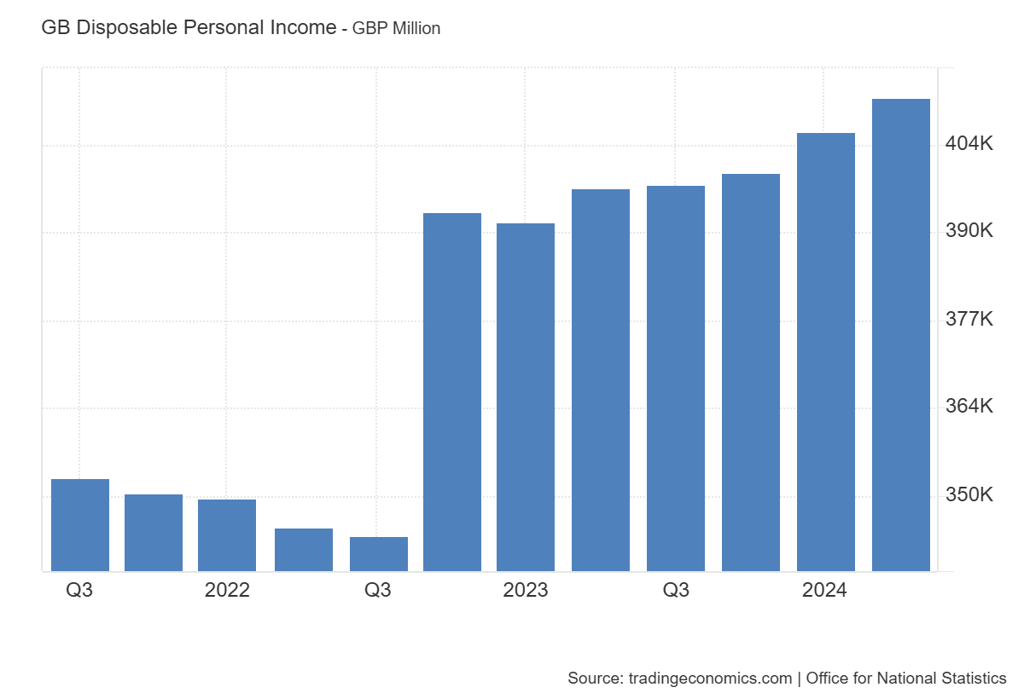

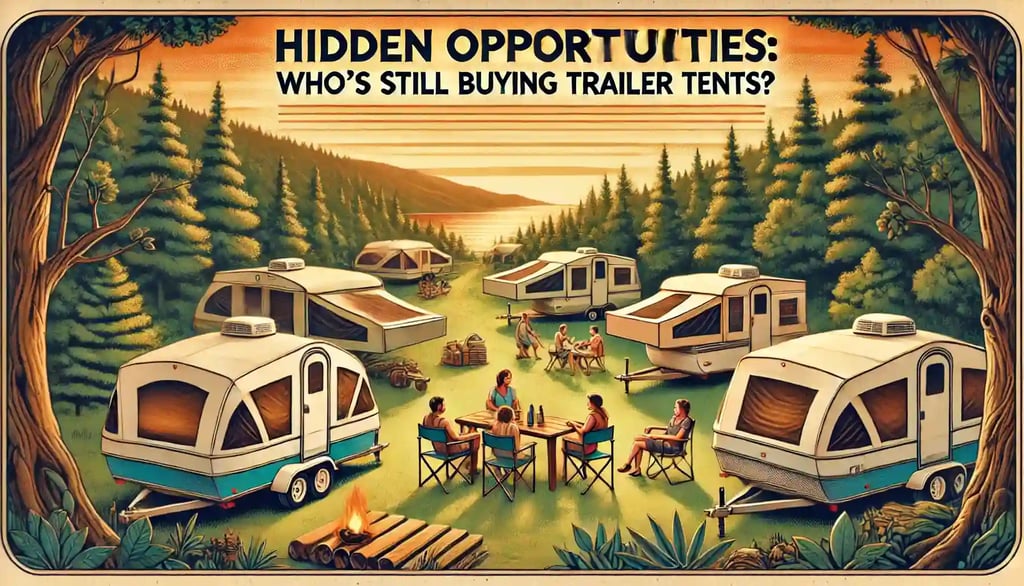

Here’s the shortlist of things to do:
Focus on the value and benefits of your product
Highlight benefits: Show how your product/service meets essential needs. Frame it as an investment, not a luxury. Showcase durability, cost savings, or unique advantages.
Make pricing clear. Show customers why your product is worth the price and how it compares to others.
Strengthen trust in your brand and authority
Use social proof. Share testimonials, success stories, and case studies. Show how others have benefited.
Show off awards, certifications, or partnerships with reputable organisations. They prove your expertise and high standards.
Offer flexible purchase options
Promote risk-free guarantees like money-back guarantees or free trials. They assure customers they won't regret their purchase.
Introduce payment flexibility by offering instalment payments, discounts, or subscriptions to lower upfront costs and reduce purchase risk.
Emphasise your customer care and support
Show your support team. Let customers know you have dedicated support to help them with any issues after they buy.
Offer guides and resources that help users see you as a reliable partner.
Get closer to your customers in your social media channels and communities (if you have them)
Use social media to talk with customers openly and honestly about their concerns.
Showcase brand values and community commitment by highlighting social responsibility initiatives and community engagement. This builds goodwill and positions your brand as caring and community-oriented.
Up your personalisation game
Use customer data to tailor messages that address specific problems like affordability, long-term value, or product quality.
Recognise the current situation in your messaging and empathise with your customers. Show that your brand understands their needs and is responsive.
Run promotions that focus on value
Consider limited-time promotions that highlight value instead of deep discounts, which could harm your brand.
Build long-term relationships with customers by offering loyalty programmes and rewarding repeat purchases.
The key to overcoming low consumer confidence, build trust by demonstrating clear value and reducing perceived risk. Position your brand as a reliable, supportive, and transparent choice that prioritises customer interests.


5. Strategies for the Brave: How to Stand Out in Tough Times
As I did with the software company, you have to look at how you are going to gain market share.
That means continuing to market your product or service. But make sure you invest your marketing in channels where your ideal customers spend their time.
It means being ruthless with your resources, and realising that cutting back on your marketing is the wrong thing to do. Just focus on making your product or service different from your competitors. Be aggressive about getting in front of your best customers.
It means helping your customers and showing new prospects why they should consider your product or service. Showing your customers you're still there for them, instils confidence in them that you'll be there to help them when they need it.
It means showing new people why they should buy your trailer tent on channels like TikTok, which you might not have thought about before now.
And when consumer confidence is low, you need to persuade them that your brand is worth it.
6. The Future of Trailer Tents: A Niche Worth Pursuing?
The future for trailer tents and folding campers is still strong. But it’s important to reinforce the innovations, benefits, and joys of owning one over owning a small caravan.
Trailer tent manufacturers need to adapt and evolve their marketing strategy to keep their market share. And then grow it, and inspire new generations who want to go camping in more comfort. But they can do it in a more budget-friendly way than they might have expected.
If you want help with reaching more of the right people for your product who are likely to buy it, get in touch! Contact us here!
If you don't already subscribe to The Adventure Business Update newsletter click the 'Join' button below to get the latest updates.
Insights
Stay updated with trends in outdoor leisure.
Subscribe
Connect
Call +(44) 07725 003675
© 2026 Digi-Business Ltd All rights reserved
Resources
Registered Address:
The Adventure Business Update
c/o Digi-Business Ltd (t/a Digital Business)
Lytchett House
13 Freeland Park
Wareham Road
Poole
Dorset
BH16 6FA
